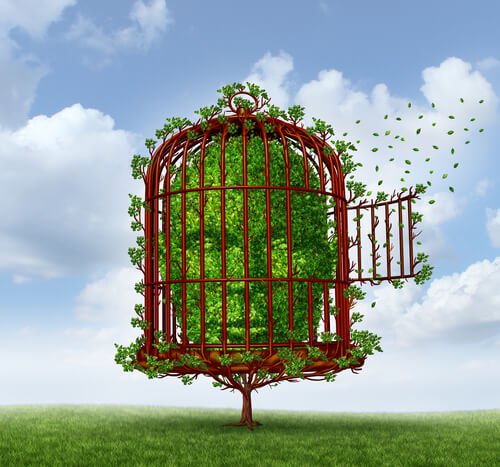Your Limits Are Only In Your Mind

The limits that we impose upon ourselves don’t actually exist. They are beliefs that we have adopted throughout our lives since childhood. They are barriers that we have built based on what we learned from our parents and teachers. They are not necessarily limits we have reached on our own.
To begin to overcome the limits we impose upon ourselves, it is essential to fully grasp in our minds and our hearts that they are in fact self-imposed. There are certain disciplines, such as coaching or NLP (neuro-linguistic programming) that deal specifically with making us see those limits and how we can overcome them.
“All children are born artists. The challenge is that they keep being so when they grow up.”
-Pablo Picasso-
How and where our limits are created
We are all born with a certain set of genes that allow us to do some things better than others. However, that does not mean that we have to give up all the things that we don’t do well. Therefore, we can say that genetics is actually the primary origin of our limits.
The environment in which we live, our family, our friends, our education, are all essential factors in the forming of many of our self-imposed limits. All of these factors also influence the way in which we discover our own talents and how we perceive the activities we feel passionate about.

When referring to education, it is important to highlight that if we observe children, we will see that they don’t have any kind of limitations when trying anything they want to try. This is because they believe they are capable of doing whatever it is. Ken Robinson, a British writer and educator, maintains that as we grow up, the education system prepares us for the “real world”. But what is the real world? Of course, it is not the same thing that it was years ago.
The problem is that the current education system was established in the era of industrialization, a time period in which many specialists were needed for specific disciplines related with material production. The price of increasing those materials was paid with creativity from areas like music, writing, sports, and dance.
Paradoxically, we currently live in a society completely different than before, but with an education system that remains the same. Thanks to static nature of the education system, what is being taught in schools is another one of the factors that impose mental limits that we later internalize.
“Every child is an artist, because every child blindly believes in their own talent. The reason is that they have no fear in being wrong, in making a mistake. Until society shows them, little by little, that errors exist and that they are shameful.”
-Ken Robinson-
What should we learn to overcome our limits?
Children are not afraid of experimenting, of thinking differently. Therefore, it is important to recover that creativity and learn, or re-learn, how to think like a child. It is important to learn how to fearlessly create, to be free from limitations, and to do everything we feel passionate about. But what is it that we should learn if we want to eliminate our limits?
To recover a great ability to learn
Children posses innate curiosity for things around them. They look at everything, they touch everything, they explore everything. They never stop being interested in all kinds of things. Thanks to that innate curiosity, their ability to learn is immense.
To overcome the fear of being wrong
Children are not afraid of mistakes. We learn that fear little by little as we grow up and internalize the idea that a mistake is something bad. It is also necessary to learn and recognize that a mistake can be a very valuable experience, and can even be a success in itself.
To do everything with passion
Developing the things that we feel passionate about and putting hope into the things we do will greatly improve the results we get. If we don’t feel passionately about the job we have now, maybe it is time to change it. Maybe it is time to be honest about what we really enjoy, and work on doing whatever that is.
To play

A child can learn to play with anything. From a simple cardboard box to a fancy remote control car, they never stop trying and exploring new things. However, adults have lost the ability to enjoy and play in order to learn. We continuously say to ourselves things like “I can’t,” “I am not able,” which constantly reinforce our self-imposed limits.
“No matter how many times you are wrong or how slowly it takes you to make progress, you are still ahead of those who do not even try.”
-Anthony Robbins-
The limits that we impose upon ourselves don’t actually exist. They are beliefs that we have adopted throughout our lives since childhood. They are barriers that we have built based on what we learned from our parents and teachers. They are not necessarily limits we have reached on our own.
To begin to overcome the limits we impose upon ourselves, it is essential to fully grasp in our minds and our hearts that they are in fact self-imposed. There are certain disciplines, such as coaching or NLP (neuro-linguistic programming) that deal specifically with making us see those limits and how we can overcome them.
“All children are born artists. The challenge is that they keep being so when they grow up.”
-Pablo Picasso-
How and where our limits are created
We are all born with a certain set of genes that allow us to do some things better than others. However, that does not mean that we have to give up all the things that we don’t do well. Therefore, we can say that genetics is actually the primary origin of our limits.
The environment in which we live, our family, our friends, our education, are all essential factors in the forming of many of our self-imposed limits. All of these factors also influence the way in which we discover our own talents and how we perceive the activities we feel passionate about.

When referring to education, it is important to highlight that if we observe children, we will see that they don’t have any kind of limitations when trying anything they want to try. This is because they believe they are capable of doing whatever it is. Ken Robinson, a British writer and educator, maintains that as we grow up, the education system prepares us for the “real world”. But what is the real world? Of course, it is not the same thing that it was years ago.
The problem is that the current education system was established in the era of industrialization, a time period in which many specialists were needed for specific disciplines related with material production. The price of increasing those materials was paid with creativity from areas like music, writing, sports, and dance.
Paradoxically, we currently live in a society completely different than before, but with an education system that remains the same. Thanks to static nature of the education system, what is being taught in schools is another one of the factors that impose mental limits that we later internalize.
“Every child is an artist, because every child blindly believes in their own talent. The reason is that they have no fear in being wrong, in making a mistake. Until society shows them, little by little, that errors exist and that they are shameful.”
-Ken Robinson-
What should we learn to overcome our limits?
Children are not afraid of experimenting, of thinking differently. Therefore, it is important to recover that creativity and learn, or re-learn, how to think like a child. It is important to learn how to fearlessly create, to be free from limitations, and to do everything we feel passionate about. But what is it that we should learn if we want to eliminate our limits?
To recover a great ability to learn
Children posses innate curiosity for things around them. They look at everything, they touch everything, they explore everything. They never stop being interested in all kinds of things. Thanks to that innate curiosity, their ability to learn is immense.
To overcome the fear of being wrong
Children are not afraid of mistakes. We learn that fear little by little as we grow up and internalize the idea that a mistake is something bad. It is also necessary to learn and recognize that a mistake can be a very valuable experience, and can even be a success in itself.
To do everything with passion
Developing the things that we feel passionate about and putting hope into the things we do will greatly improve the results we get. If we don’t feel passionately about the job we have now, maybe it is time to change it. Maybe it is time to be honest about what we really enjoy, and work on doing whatever that is.
To play

A child can learn to play with anything. From a simple cardboard box to a fancy remote control car, they never stop trying and exploring new things. However, adults have lost the ability to enjoy and play in order to learn. We continuously say to ourselves things like “I can’t,” “I am not able,” which constantly reinforce our self-imposed limits.
“No matter how many times you are wrong or how slowly it takes you to make progress, you are still ahead of those who do not even try.”
-Anthony Robbins-
This text is provided for informational purposes only and does not replace consultation with a professional. If in doubt, consult your specialist.







